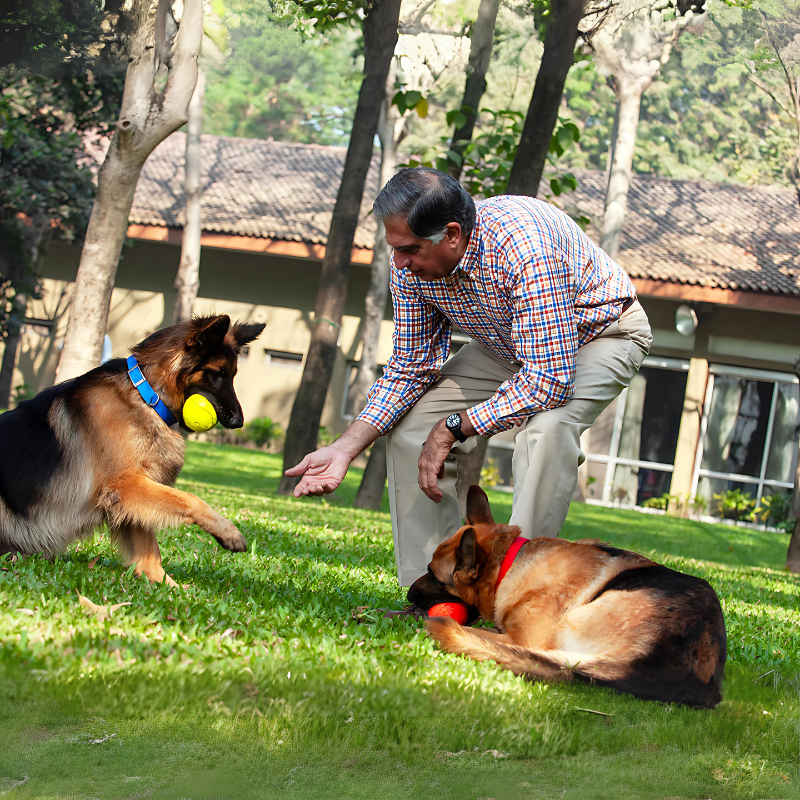India lost an extraordinary figure on October 9, 2024, with the passing of Ratan Naval Tata. Known as one of the most influential industrialists in India’s history, Tata’s name is synonymous with progress, philanthropy, and corporate success. However, there was another side to this giant, a side driven by compassion for animals, particularly stray dogs. His empathy for these voiceless beings wasn’t just a passing interest – it was a lifelong commitment that became integral to his legacy. With his departure, India needs more individuals like him – people who care deeply for animals and use their influence to change the way we treat them.

At the iconic Taj Mahal Hotel in Mumbai, he made sure that stray animals were treated with care and respect. His instructions to the hotel staff to welcome them showed his belief in kindness and empathy for all living beings. This was not just a symbolic gesture but a powerful statement. It reminded India that compassion should transcend the boundaries of business and society.
In 2018, Tata was invited to Buckingham Palace by then-Prince Charles to receive a lifetime achievement award for his contributions to philanthropy. However, his beloved dog Tito fell gravely ill just days before the event. Rather than attend the prestigious ceremony, Tata cancelled his trip to stay by Tito’s side. This choice, which many might have seen as surprising, was a testament to his unconditional love for animals. His deep connection to Tito reflected his broader philosophy: animals were family, deserving of the same love and care as any human.
Under Tata’s leadership, the headquarters of the Tata Group, Bombay House, became a sanctuary for stray dogs.
When the building underwent renovation, he ensured that the space included a dedicated area for strays. These dogs, who were once ignored or mistreated by society, were given a climate-controlled environment with plush cushions, showing the depth of his care. It was a gesture that spoke volumes. In a world where animals are often seen as secondary, Ratan Tata ensured that his corporate environment reflected his values. Unlike the human employees, these dogs did not need access cards to enter Bombay House, emphasising their unique place in his heart.
In his later years, Tata’s commitment to animals extended further. Just a few months before his death, he inaugurated the Tata Trusts Small Animal Hospital in Mumbai’s Mahalaxmi area. This hospital, a state-of-the-art facility offering 24/7 emergency care for pets, was an initiative Tata had long envisioned. With over 200 beds, it aimed to fill a significant gap in India’s veterinary care infrastructure. For Tata, this wasn’t just another philanthropic project – it was a deeply personal one. He knew how much pets meant to their families and was determined to ensure they received the best possible care.

Tata’s lifelong dedication to animals has left an indelible mark on India. But his passing leaves a void that must be filled. Today, there is a growing intolerance toward dogs in many parts of the country. Stray dogs, once cared for and tolerated, are now often viewed with fear or hatred. This shift in attitude is dangerous, not just for the animals but for the society we live in. Ratan Tata’s example shows us that compassion isn’t a weakness – it’s a strength. It is a quality that makes us more human and brings us closer to creating a world where all living beings can coexist peacefully.
As we reflect on Ratan Tata’s legacy, the need for more compassionate leadership in India has never been greater. We need influential people – politicians, business leaders, celebrities – to step forward and continue Tata’s work. We need them to show that animals deserve care, respect, and protection. This is especially true as we face the challenges of urbanisation, where strays are increasingly seen as a nuisance rather than a part of our communities.
At K9 School, where we work daily to tackle the growing issues of animal abuse, abandonment, and the global shortage of skilled dog handlers, we’ve seen firsthand the impact that compassionate leadership can have. There’s a shortage of reliable, trained dog professionals across India. Through our work, we’ve certified over 100 professionals, from trainers to pet-sitters. But more is needed. Ratan Tata’s influence reached across India, and his advocacy for dogs encouraged people to care for these animals who have been historically neglected.
His passing reminds us that while one person can make a significant impact, the responsibility cannot fall on one individual alone. It is now time for others to step up. We need more national icons, more influential people like Ratan Tata, to use their platforms for good. They can shift public attitudes, create awareness, and provide the resources necessary to ensure the humane treatment of dogs.
The legacy of Ratan Tata reminds us that true progress isn’t just about economic success – it’s about empathy, compassion, and kindness to all living beings. India needs more leaders like him, especially now. With the rising mistreatment of animals, the country must look to Tata’s life as a blueprint for how to create a more compassionate future. Let’s hope that in his memory, more people will rise to the occasion and continue his work of building a better world for both humans and animals alike.

One reply on “What Ratan Tata Left Behind for India’s Dogs”
Ratan Tata’s compassion for animals inspires us to lead with kindness. 🐾❤️ #LegacyLivesOn